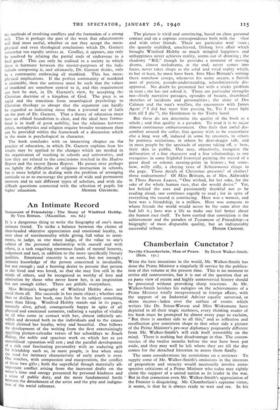An Intimate Record
Testament of Friendship : The Story of Winifred Holtby. By Vera Brittain. (Macmillan. ms. 6d.)
IT is a dangerous thing to write the biography of one's most intimate friend. To strike a balance between the claims of clear-headed objective appreciation and emotional loyalty, to steer clear of sentimentality while giving full value to senti- ments, to judge, as one must judge, of the value to one's subject of the personal relationship with oneself and with others, is a task requiring enormous funds of mental honesty, judgement and tact, in addition to the more specifically literary qualities. Emotional sincerity is an asset, but not enough ; intimate knowledge of the person concerned is invaluable, but not enough ; and a burning desire to present that person as she lived and was loved, so that she may live still in the minds of others, and be recognised as worthy of love and admiration by those who never knew her, is an inspiration but not enough either. There are pitfalls everywhere.
Miss Brittain's biography of Winifred Holtby does not avoid them all. She succeeds in her main object ; whether one likes or dislikes her book, one feels for its subject something more than liking. Winifred Holtby stands out in its pages, intensely alive, gifted, courageously happy in spite of all physical and emotional torments, radiating a surplus of vitality on all who came in contact with her, almost infinitely un- selfish and devoted both to the individuals and to the causes which claimed her loyalty, witty and beautiful. One follows the development of the writing from the first entertainingly appalling picture-calendar verses of her schooldays to South Ruling, the noble and spacious work on which her as yet unstabilised reputation will rest ; and the parallel development of a rich and fascinating personality with an enduring gift for friendship such as, in most people, is lost when once the need for intimacy characteristic of early youth is over. One watches, with compassion and exasperation, the conflict of these two gifts ; both the superficial though materially all- important conflict arising from the incessant drafts on the writer's time and energy presented by personal kindness and a sense of public duty, and the more fundamental battle between the detachment of the artist and the pity and indigna- tion of the social reformer.
The picture is vivid and convincing, based on close personal contact and on a copious correspondence both with the 'thor and with other friends. There are particular weal ; the queerly stultified, unachieved, lifelong love affair which brought Winifred Holtby so much mingled happiness and unhappiness never achieves reality, seems out of drawing ; the shadowy " Bill," though he provides a moment of moving drama, almost melodrama, at the end, never comes into focus, never takes shape as the solid and vivid reality which, to her at least, he must have been. Into Miss Brittain's writing there somehow creeps, whenever his name occurs, a flattish note of patient, pseudo-understanding, schoolmistressly dis- approval. No doubt he presented her with a sticky problem in taste ; she has not solved it. There are particular strengths too—lively narrative passages, episodes of beauty, thumbnail sketches of incidents and personalities ; the story of Dot Calman and the nun's woollies, the encounters with James Agate (" I did but meet him passing by, Yet I must fight him till I die "), the Gentleman in the Tenby hotel.
But these do not determine the quality of the book as a whole ; and that quality is a paradox. To read it is to suer almost continuous embarrassment. One feels that awful dis- comfort around the collar, that queasy wish to be somewhere else a long way off, induced in some by crooners, in others by patriotic recitations, in others by dear-doggie talk, and in most people by the spectacle of anyone taking off, ar here, their skin in public. One may, objectively, recognise the delineation of a fine character and a fine relationship, as one recognises in some frightful historical painting the record of a great deed or solemn turning-point in history ; but some- how, willy nilly, a cloying taste of Schzviirmerei clings to the page. Those details of Christmas presents! of clothes! those endearments! Of Miss Brittain, as of Mrs. Aldwinkle in Those Barren Leaves, "One wished, for her sake, for the sake of the whole human race, that she would desist." Yet, hot behind the ears and passionately thankful not to be reading aloud, one continues eagerly to read ; for in spite of everything the record is convincing. Here was a woman, and here was a friendship, in a million. Here was someone to whose friends the world would never be the same after she had left it ; here was a life to make one feel better about the human race itself. To have carried that conviction is the achievement and the paradox of Testament of Friendship—a biography of most disputable quality, but an indisputably






































 Previous page
Previous page